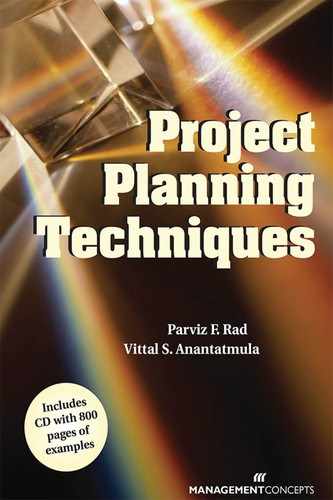Preface
We were motivated by two factors to write this book. The first is that many of the currently available books dealing with project planning cover the subject in a discipline-specific mode, such as construction planning and management, software development planning, and process plant planning and scheduling. Admittedly, there is a great deal of commonality in project planning—and ultimately project management—techniques across all industries. However, distilling the non-discipline-specific topics is sometimes difficult because they tend to get masked by the details of the discipline that is the subject of the project.
The second factor that motivated us to write Project Planning Techniques is our belief in the need for a book that reflects a balance of both practical experience and academic rigor in project management. Our years of experience managing projects in industry and teaching project management in university settings have convinced us of the need for a catalyst for project management professionals to develop a deeper understanding of the subject matters from this dual professional and academic perspective.
In this book, we cover the fundamentals of project planning in a discipline-independent context. We provide a quick overview of project planning, estimating, scheduling, progress monitoring, change management, and knowledge management. We direct particular attention to the accuracy of the estimates for cost and duration, as well as the issues surrounding cost and schedule overruns.
The introductory chapter deals with project selection and prioritization with the use of indices and models. Chapters 2 and 3 describe in some detail the processes and intricacies involved in developing a work breakdown structure (WBS) and a resource breakdown structure (RBS). These chapters delineate the steps involved in constructing the WBS and the RBS, which are the fundamentals of a good project plan and which provide a logical basis for project monitoring and control. Examples of WBS and RBS are provided at the ends of these chapters.
Chapter 4 introduces the concept of bottom-up estimating and the steps involved in creating a detailed estimate baseline. It also discusses the various models that estimators use to arrive at rough estimates during the early stages of project conception. The chapter discusses the issues of estimate accuracy and baseline volatility in the context of the need to provide estimates for use in making judgments about project authorization.
Chapter 5 deals with developing the schedule network and, ultimately, the project schedule. This chapter emphasizes the importance of cost and schedule integration. Chapter 6 addresses project planning and project management issues as they relate to external projects. The topics of bidding, specifications, indirect cost, and overhead are discussed, particularly as they relate to contractor performance and how it affects the client-contractor relationship.
Chapter 7 deals with the processes and techniques involved in monitoring project resource expenditures during the project implementation phase. Chapter 8 shows how the data collected by the monitoring activities will assist the project manager in dealing with the inevitable changes that occur during project implementation. It also covers the causes of changes to the project environment and the procedures involved in resolving problems that arise from these unexpected changes.
Finally, Chapter 9 addresses the emerging concept of the relationship and similarities between knowledge management and project management, stressing the importance of managing project knowledge by integrating project management and knowledge management systems. With the hope that Project Planning Techniques will serve as a complete reference, we also have included a CD containing a set of comprehensive examples, including RBS, WBS, project estimates, and network diagrams, that represent several different industries.
Parviz F. Rad
